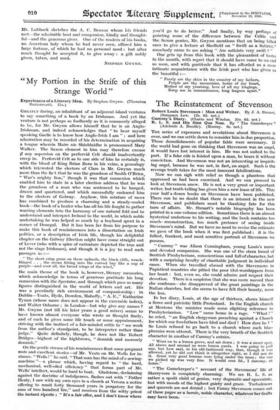" My Portion in the Strife of this Strange World
"
Experiences of a Literary Man. By Stephen Gwynn. (Thornton
Butterworth. 218.)
GREATLY daring, an inhabitant of an adjacent island ventures to say something of a book by an Irishman. And yet the venture is not perhaps so foolhardy as it is commonly alleged to be, for Mr. Gwynn allows himself that he is an Anglo- Irishman, and indeed acknowledges that " to hear myself speaking. Gaelic is to know how Anglo-Irish I am " ; and here admiration may be recorded of his determination in acquiring a tongue wherein Maim nic Shiublaidhe is pronounced Mary Walker. The Saxon element in him may therefore excuse if any aspersion on the perfervid Celt should inadvertently creep in. Perfervid Celt as to one side of him he certainly is, with the blood of King Brian Boru in his veins, a genealogy which interested the electors of Clam in Mr. Gwynn much more than the fat that he was the grandson of Smith O'Brien, " War's mighty lion," though it was that connexion which enabled him to state in a later election address that he was the grandson of a man who was sentenced to be hanged, drawn and quartered, and which successfully endeared him to the electors of Galway. Anyhow, this mixture of races has combined to produce a charming and a steady-souled book—the book of a healer who has all his life fought to gather warring elements into the harmony of one natural fold and to understand and interpret Ireland to the world, in which noble undertaking he was helped so much by a boyhood spent in a corner of Donegal. But it has been far from his purpose to make this book of reminiscences into a dissertation on Irish politics, or a description of Irish life, though his delightful chapter on the Galway Election might have come straight out of Lever (who with a spice of caricature depicted the true and not the stage Irishman), and though it is a joy to read such passages as :— " The short crisp grass on these uplands, the black cliffs, wrack- fringed . . . the ocean fitting into the curved bay like a cup of purple—and over all, the broad wings of the wind," the main theme of the book is, however, literary memories, which acknowledge in terms of generous gratitude his long connexion with the Spectator, and through which pass so many figures distinguished in the world of letters and art. His was a peculiarly rich environment of companionship : in Dublin—Yeats, Hyde, Dowden, Mahaffy, " A. E.," Katharine Tynan (whose name does not appear in the execrable index), and Walter Osborne ; in London—but why give any names ? Mr. Gwynn (not till his later years a good mixer) seems to have known almost everyone who wrote or thought finely, and of each he gives some life touch or some appraisement, striving with the instinct of a fair-minded critic to " see work from the author's standpoint, to be interpreter rather than judge." Quite definitely, though, he does not like Robert Bridges—highest of the highbrows, " donnish and morosely donnish."
On the gentle stream of his reminiscences float some pregnant mots and excellent stories—of Mr. Yeats on Mr. Wells for in- stance. " Wells ! " he said. " That man has the mind of a sewing- machine "—a phrase which, having regard to " the hard, mechanical, well-oiled efficiency " that forms part of Mr. Wells' intellect, would be hard to beat. Gladstone, declaiming against the doctrine of indulgences, flashes out with " Father Healy, I saw with my own eyes in a church at Verona a notice offering to remit forty thousand years in purgatory for the stun of two hundred lire," and receives from the witty priest the instant riposte ; " It's a fair offer, and I don't know where you'd go to do better." And finally, by way perhaps of pointing some of the difference between the Celtic and the Saxon genius, Mr. Gwynn mentions that on being billed once to give a lecture at Sheffield on " Swift as a Satirist," somebody came to me asking " Are satirists very_ swift ? "
One gets up from this book with the pleasantest of tastes in the mouth, with regret that it should have come to an end so soon, and with gratitude that it has afforded us a more intimate acquaintance with the Irish poet who has given us
the beautiful -
" Pearly are thy skies in the country of my fathers,
Purple are thy mountains, home of my heart, Mother of my yearning, love of all my longings, Beep me in remembrance, long leagues apart."






























































 Previous page
Previous page